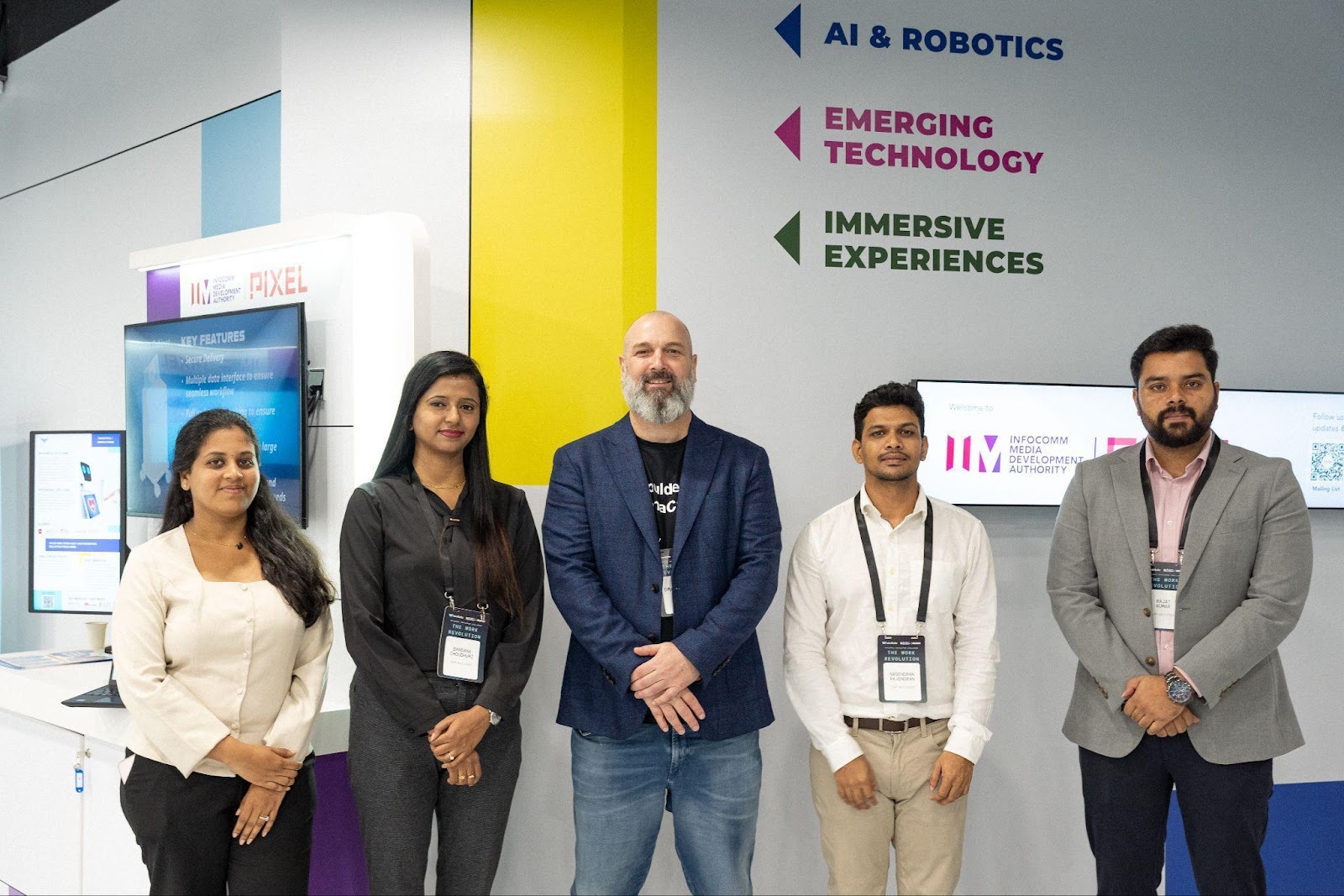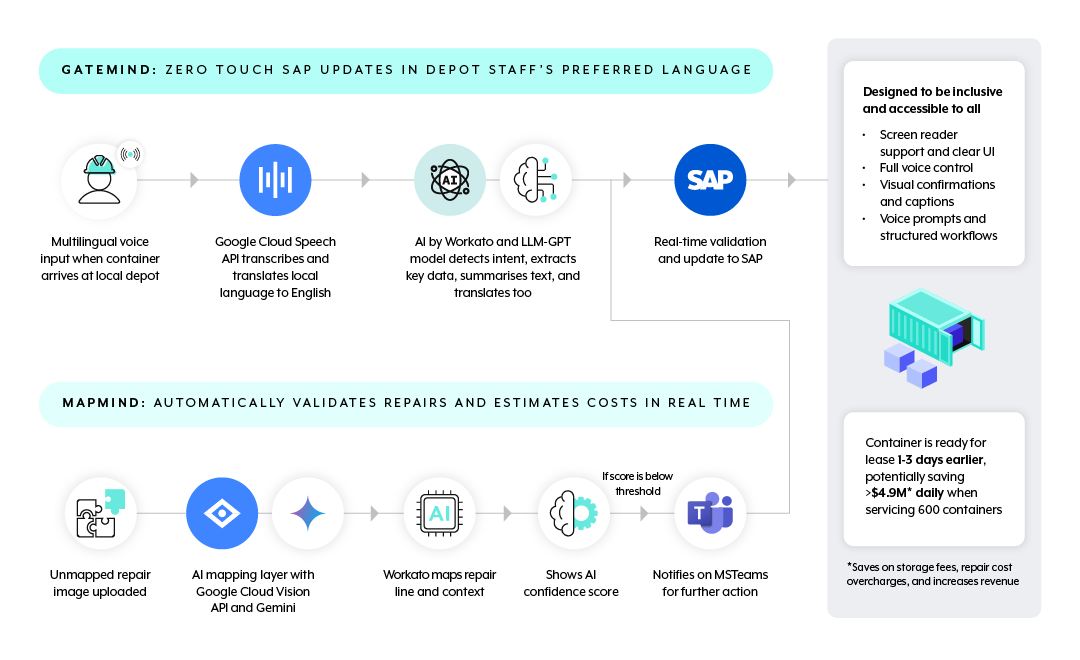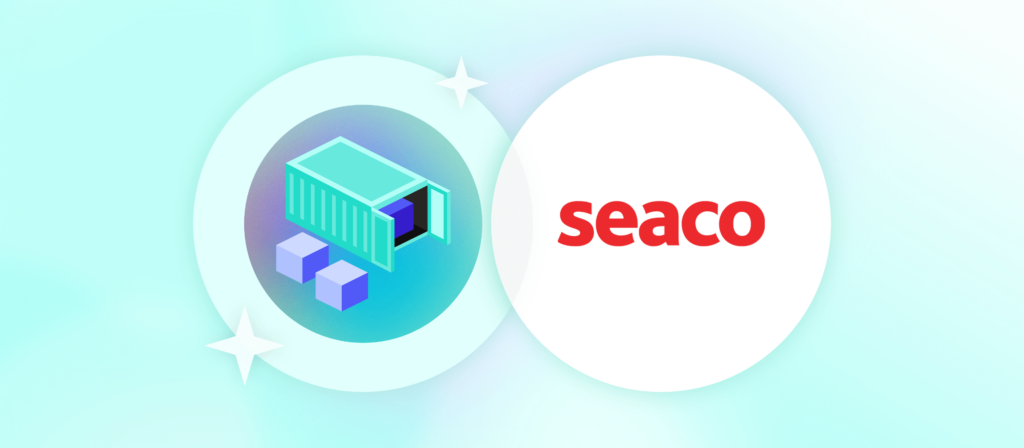Introducing the second-place winner of the Workato x IMDA National Developer Challenge
Hailing from one of the world’s largest lessors of shipping containers, Seaco, five talented technologists joined the Workato x IMDA National Developer Challenge asking a simple yet profound question: “What if frontline depot staff could talk to a system, and it just works?” This led them on a journey to transform ground-level logistics with cutting-edge automation, integration and AI, bringing voice, vision, and intelligence into depot operations.
Their solution – GateMind and MapMind – reimagines the process of inspecting containers at a depot with integrated AI-driven, voice-enabled orchestration, and is thoughtfully designed to be accessible and inclusive to all workers. An AI agent even automates the documentation process by reading and triaging image-based damage assessments for containers. This trailblazing innovation earned Seaco a coveted second place and has the potential to transform not just logistics, but industries far and wide.

Steering Away From Costly Delays
Nagendran, Bandana, Ramya, Rajat, and Cheng Yi incubated their revolutionary idea under Seaco’s DevHack program, an internal IT experiment by their visionary CIO Damian Leach. Spotting the team’s potential “to make waves in enterprise IT”. Damian coached, mentored and motivated them to turn their idea into a reality – a working prototype for the National Developer Challenge. Team Nauticodes was born from this grassroots initiative. They first zoned in on the pain points, to fully understand the implications on the business and the people involved.
Setting Sail with GateMind and MapMind
Like all challenge participants, Team Nauticodes had full access to Workato’s Enterprise Orchestration capabilities, with powerful AI features like AI by Workato. They made full use of it to build GateMind and MapMind.

“Our solution is both intelligent and inclusive to all workers,” emphasized Bandana, citing a UN DESA report on how the lack of assistive technology limits 80% of working-age disabled persons from accessing jobs and realizing their full potential.
When asked about their build experience, the team had this to say:
Immense Real-World Impact
The team not only impressed all five judges with their robust technical demonstration, but also with their staggering business impact projections:
- Faster asset turnaround: Containers can be ready for lease 1-3 days earlier, instead of idling in storage.
- Significant savings: Seaco processes ~220,000 containers through its ports, depots every year. The time these assets are in the depot will greatly reduce and in turn reduce operational costs. The automation also speeds up the decision-making process to put assets on lease faster, generating additional revenue.
- Profitability boost: With improved container utilization, the solution has the potential to improve top line revenue.
- Accurate repair reporting: Repair costs can be estimated in real-time and synced with backend systems to ensure accuracy.
- Strengthening our partnerships: As the solution enables swift decision making, Depot operators also benefit as the occupancy of the site is reduced – they can move the assets to repair lines without the need to move them to storage areas on site whilst they wait for a repair decision. This reduces the operating costs and time taken to turn the assets around.
- Reduction in manual process: The manual process – to review and categorize photos, create emails, decide and then process the repair by entering data into the core transaction platform – will be fully automated via this solution. This saves hours of work across multiple teams in Seaco.
Charting the Course for Scaling with Workato
With no time to lose, Team Nauticodes is in the process of testing their solution at Seaco’s depots, but the ripple effects of their innovation are set to extend beyond the logistics and warehousing industry, to sectors like manufacturing, healthcare, insurance, construction, utilities and field services.
“Our AI agent architecture is secure, scalable and flexible. We used Workato to build it to be modular and industry-agnostic, so that it can work with any system via APIs and benefit any industry that requires a groundbreaking way to integrate voice, image, and AI,” highlighted Damian Leach, Seaco’s CIO.
“This is incredible. It could solve an age-old challenge that insurers face with assessing damages immediately on site rather than waiting for a repair shop to advise on claims,” said one judge, before his fellow panelists quickly chimed in to praise the solution’s practicality, scalability, and inclusiveness.
The team credits their success to the power of collaboration, vision, and determination. Their solution not only promises to deliver remarkable efficiency gains, but also sets a benchmark for inclusive technology design.
Accessible design creates better and faster systems for everyone and allows the net to be cast wider during the recruitment process to provide opportunities to the local communities our Depot partners operate in,” urged Damian.
Read about the first and third place winners of the National Developer Challenge.



